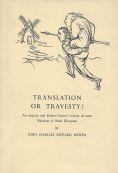The Love Song of J. Omar Khayyam (1973): parody of T. S. Eliot. Roy Fuller.
American Literature, 1973.
Archives
Omar the Wise
Omar the Wise
In: World of wonder, 1973, nr. 165, p. 14-15
Over the centuries, from far-away Persia, come the sad, sweet words of wisdom of that land’s most famous bard.
The enigma of Edward FitzGerald
The enigma of Edward FitzGerald. J.L. Borges.
In: Other inquisitions, 1937-1952. London : Souvenir Press, 1973. ISBN: 0-285-64711-3
Borges ponders on the mysterious connection between Khayyám and FitzGerald. A miracle that happened: from the fortuitous conjunction of a Persian astronomer who condescends to write poetry, and an eccentric Englishman who peruses Oriental and Hispanic books, emerges a poet who does not resemble either of them. He suggests a deep-seated, a-Platonic connection between philosophy, mathematics, and poetry.
The Rubaiyat of Omar Khayyam: a critical assessment of Robert Graves’ and Omar Ali-Shah’s ‘translation’
The Rubaiyat of Omar Khayyam: a critical assessment of Robert Graves’ and Omar Ali-Shah’s ‘translation’. J.C.E. Bowen
Iran: Journal of Persian studies 11 (1973), pp. 63–73
When Cassells in November 1967 published Robert Graves’s versification of 111 of Omar Khayyam’s quatrains, they announced it to be “for the first time a true translation of Omar Khayaam which reverses his philosophy as presented, in ignorance of the Persian language and of Sufi symbolism, by Edward FitzGerald”. They also called it “one of the most important literary revelations of our time”. In this article, the validity of these claims is examined.
Translation or travesty?
Translation or travesty? an enquiry into Robert Graves’s version of some Rubaiyat of Omar Khayyam. John Charles Edward Bowen. Abingdon, Abbey Press (Berks), 1973. Freshet library, no. 2. IX, 43 p. ISBN: 0900012323.
Summary:
Bowen discusses whether Edward FitzGerald’s (1859) or Robert Graves’s (1967) version of Omar Khayyam’s Rubaiyat is a more accurate translation; it explains the scope of the great Islamic philosophy of Sufism, and questions whether a mystical interpretation of the quatrains accords with Khayyam’s known scepticism; and it quotes conclusive evidence that Robert Graves’s version of the Rubaiyat, so far from having been translated from a manuscript which has lain bidden in the Hindu Kush for the past 800 years, is based on the text of a book published in London in 1899.
